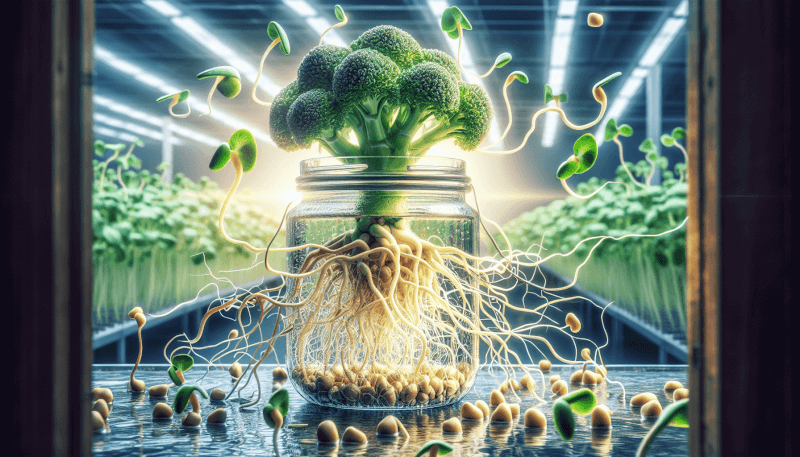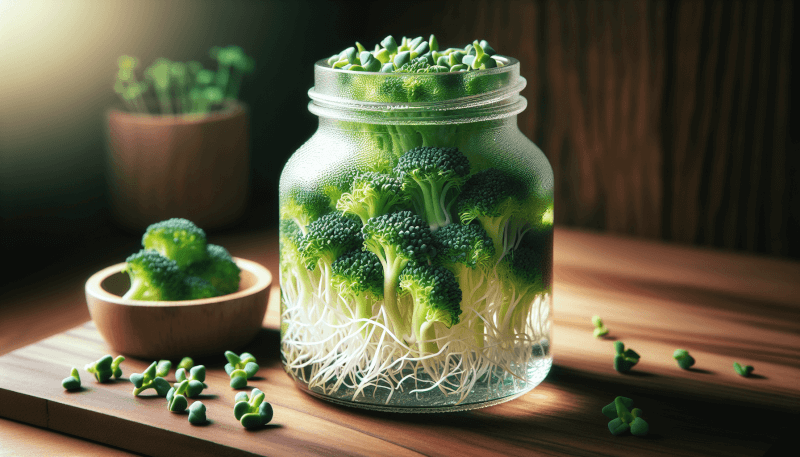👋 Click the mic button to talk to Alfred, the Todd's Seeds Gardening/Sprouting Expert – Feel free to ask him anything!
Ask Virtual Todd Anything - Click the Mic
If you’ve ever wanted to try your hand at growing your own delicious and nutritious broccoli sprouts, but don’t have access to a garden or soil, fear not! This article will show you the simple and ingenious method of growing broccoli sprouts without any soil. You’ll discover how to harness the power of water and air to cultivate these vibrant green shoots right in the comfort of your own home. With just a few basic materials and a little bit of patience, you’ll be enjoying fresh and crunchy broccoli sprouts in no time. So, let’s get started on this soil-free adventure!

Choosing the right seeds
When it comes to growing broccoli sprouts, it’s essential to start with the right seeds. Researching different varieties will help you understand the unique characteristics and flavors each one offers. Some popular broccoli sprout varieties include De Cicco, Waltham, and Green Goliath. Each variety may have slightly different growing requirements and taste profiles, so it’s worth exploring your options.
In addition to considering the variety, it’s crucial to look for organic, non-GMO seeds. Choosing organic seeds ensures that your sprouts will be free from harmful pesticides and synthetic fertilizers. Non-GMO seeds are essential to maintain the integrity of the plant’s genetic makeup and avoid any potential health risks associated with genetically modified organisms.
Preparing the sprouting container
To successfully grow broccoli sprouts without soil, it’s essential to select a suitable container. A shallow tray or dish with drainage holes will work well for sprouting. Make sure the container is large enough to accommodate the desired amount of sprouts.
Before using the container, it’s crucial to clean and sterilize it thoroughly. This step helps prevent the growth of bacteria or mold, ensuring that your sprouts remain healthy and safe to consume. Wash the container with warm, soapy water, and then rinse it thoroughly. If available, you can also sanitize the container with a dilute bleach solution, following the manufacturer’s instructions.
Soaking the seeds
Once you have your container ready, it’s time to soak the broccoli seeds. Start by measuring the desired amount of seeds, taking into consideration the space available in your sprouting container. Generally, one tablespoon of seeds is suitable for a small sprouting tray.
Place the seeds in a clean bowl or jar and cover them with filtered water. Allow the seeds to soak overnight or for at least 8-12 hours. This soaking process helps to soften the seeds’ outer coating and promotes germination.
Rinsing the seeds
After the seeds have soaked, it’s time to rinse them to remove any residue and encourage sprouting. Drain the soaked seeds using a fine-mesh sieve or colander, ensuring that all excess water is removed.
To promote optimal sprouting, it’s recommended to rinse the seeds twice a day. Gently rinse the seeds under running water, being careful not to damage any emerging sprouts. Ensure that the water is clean and filtered to prevent any potential contaminants from affecting the sprouts’ growth.

Providing moisture and airflow
To support healthy sprout growth, it’s crucial to keep them consistently moist. You can achieve this by lightly misting the sprouts with filtered water a few times a day. It’s important not to oversaturate the sprouts, as excessive moisture can lead to mold or fungal growth.
Along with moisture, proper airflow is necessary for the sprouts’ development. Adequate ventilation helps prevent the buildup of excess humidity, which can contribute to the growth of mold or bacteria. To ensure proper airflow, use a cover or lid with ventilation holes on your sprouting container. This allows for sufficient air circulation while still maintaining the right level of moisture.
Controlling temperature and light
Maintaining the optimal temperature is crucial for successful sprouting. Broccoli sprouts prefer a temperature range of 65-75°F (18-24°C) for ideal growth. Keeping the sprouts in a warm and consistent environment will encourage quick and healthy sprouting.
While broccoli sprouts don’t require direct sunlight, they do benefit from indirect light exposure. Find a well-lit area in your home that receives indirect sunlight, such as a windowsill or countertop near a window. Avoid placing the sprouts in direct sunlight, as it can lead to drying out or overheating.
Harvesting the sprouts
Once your broccoli sprouts have reached the desired size, it’s time to harvest them. Typically, sprouts are ready for harvest when they are about 1-2 inches tall and have developed their first set of true leaves.
To harvest the sprouts, use a pair of clean kitchen scissors or a sharp knife. Cut the sprouts just above the base, where they emerge from the seeds. Harvesting in this manner allows for continuous growth and the potential for multiple harvests from the same batch of seeds.
Storing and consuming the sprouts
After harvesting, it’s important to rinse the sprouts thoroughly to remove any residual hulls or debris. Gently swish them in a bowl of clean water, ensuring that all the sprouts are adequately rinsed.
Once rinsed, it’s best to store the sprouts in the refrigerator to maintain their freshness and extend their shelf life. Place the sprouts in a clean, airtight container or a plastic bag with a paper towel to absorb any excess moisture. Properly stored, broccoli sprouts can last up to a week in the refrigerator.
Potential challenges and troubleshooting
While growing broccoli sprouts is relatively easy, a few challenges can arise along the way. One common issue is mold or bacterial growth. To prevent this, ensure that your sprouts are not oversaturated with water and have proper airflow. If mold or bacterial growth does occur, it’s best to discard the entire batch of sprouts to avoid any potential health risks.
Another challenge you may encounter is uneven sprouting or slow growth. This can be due to several factors, such as improper soaking, inconsistent moisture levels, or inadequate temperature. Adjusting these factors and ensuring proper care and attention will help promote more consistent and vigorous sprout growth.
Benefits and uses of broccoli sprouts
Broccoli sprouts are not only delicious but also packed with numerous health benefits. They are rich in nutrients and antioxidants, such as vitamin C, vitamin K, and fiber. Broccoli sprouts are also a great source of sulforaphane, a compound known for its potential anti-cancer properties.
Incorporating broccoli sprouts into your daily diet is easy and versatile. You can add them to salads to provide a fresh and nutritious crunch. Sprouts also make a great addition to sandwiches, wraps, or burgers, adding a burst of flavor and texture. For those who enjoy a morning smoothie, blending broccoli sprouts into your favorite recipe can be a wonderful way to boost the nutritional content of your drink.
Growing broccoli sprouts without soil is a rewarding and straightforward process. With the right seeds, proper preparation, and attentive care, you can enjoy a continuous supply of fresh, nutrient-packed sprouts right at home. So why not give it a try and experience the joy of growing and consuming your very own homegrown broccoli sprouts?